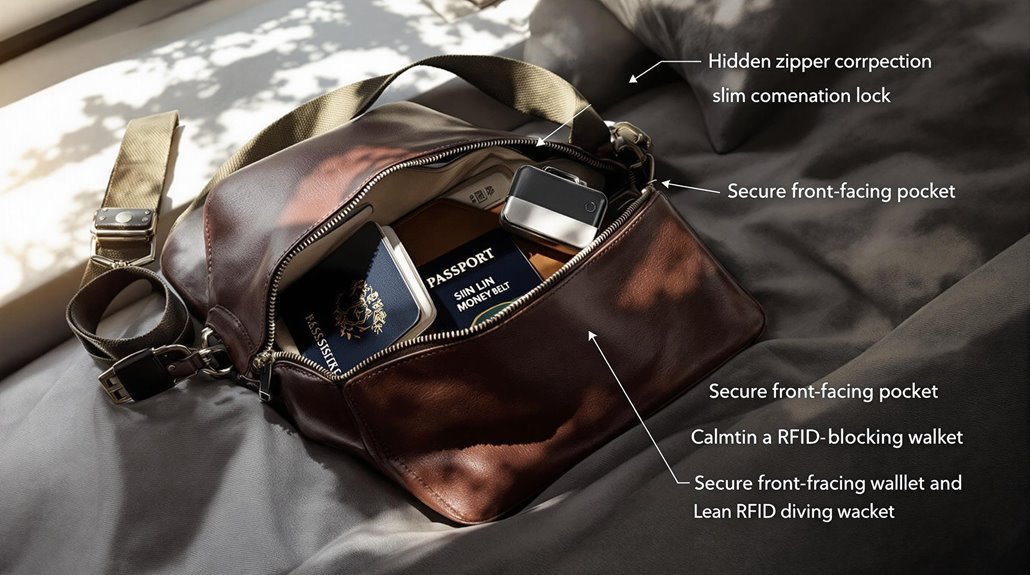Protect your valuables abroad by thinking like a savvy globetrotter, not a tourist target. You'll want to split up cash between locations, use anti-theft bags, and keep digital copies of important documents in encrypted cloud storage. Don't skip travel insurance, and always test those hotel safes before trusting them with your precious items. Remember to register with your embassy and maintain a regular check-in routine. There's a whole world of security tricks waiting to keep your treasures safe.
- Key Points
- Choose the Right Travel Insurance Coverage
- Use a High-Quality Hotel Room Safe
- Keep Digital Copies of Important Documents
- Invest in Anti-Theft Travel Gear
- Split Up Your Cash and Cards
- Master the Art of Hotel Room Security
- Stay Alert in Tourist Hotspots
- Secure Your Electronics With Tracking Apps
- Pack Smart With Secret Compartments
- Practice ATM and Credit Card Safety
- Register Your Trip With Your Embassy
- Secure Your Luggage During Transit
- Create a Daily Security Routine
- Know Local Emergency Contact Numbers
- The Last Word
Key Points
- Use hotel safes and front desk deposit boxes for storing valuables, but always test and change default codes for better security.
- Keep digital copies of important documents in multiple secure locations and encrypt devices to protect sensitive information.
- Divide cash and cards between different locations, maintaining a shadow fund separate from daily spending money.
- Utilize anti-theft bags with zippered pockets and avoid displaying valuables in public areas to deter potential thieves.
- Register travel plans with the embassy through STEP for added security and real-time safety alerts during emergencies.
Choose the Right Travel Insurance Coverage
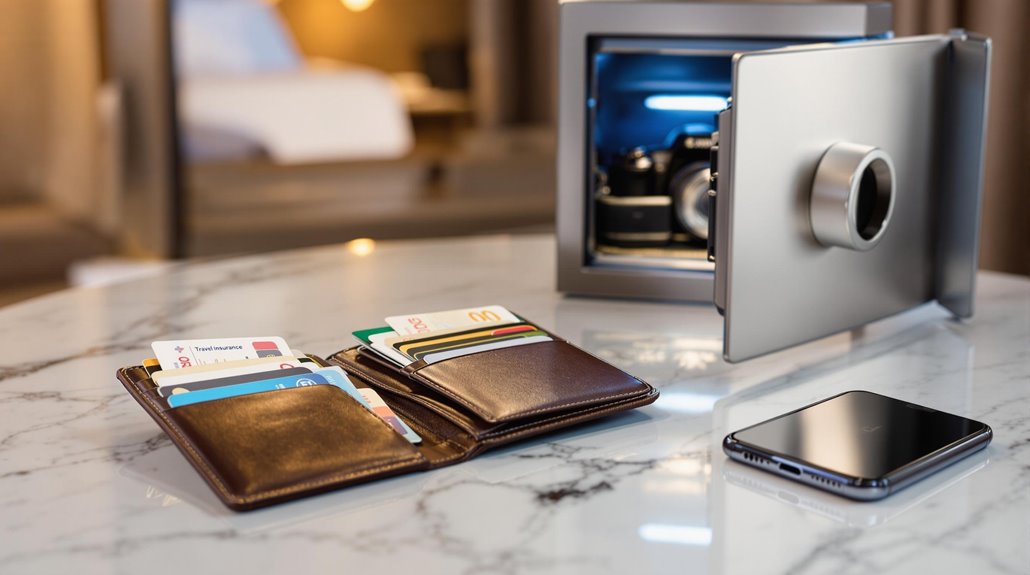
When was the last time you actually read the fine print of your travel insurance policy?
Be honest – we all avoid the policy fine print like the plague until something goes wrong on vacation.
Let's face it – most of us would rather watch paint dry. But trust me, those tiny details matter when your designer sunglasses vanish from your beach bag.
Standard policies can be sneaky with their limits. You might think you're covered for $2,500, but that fancy camera of yours could be capped at a measly $250. Without proper documentation, items are typically valued at 75% of value, which can leave you significantly short on reimbursement.
Always create a detailed emergency plan before departing to ensure you know exactly what steps to take if your valuables are stolen.
And if you're planning to pack your pro photography gear or that swanky new laptop, you'll need to upgrade your coverage. Even then, some luxury items won't make the cut without specialized protection.
Don't forget to check if you're getting actual cash value or replacement cost – there's a big difference when your three-year-old iPhone goes missing.
Use a High-Quality Hotel Room Safe
Three golden rules exist for hotel room safes: use them, test them, and don't trust them completely.
While modern electronic and biometric safes offer decent protection, they're not exactly Fort Knox. Before stashing your valuables, run a quick test of the locking mechanism, and please, ditch that obvious default code – thieves can Google those faster than you can say "where's my passport?" Master codes like 1234, 1111, or 0000 are commonly used defaults that should be changed immediately.
Here's a pro tip: toss a single shoe in with your valuables. You'll never forget to empty the safe when you're hopping around the room looking for its mate!
For extra peace of mind, consider using the front desk's deposit box for truly irreplaceable items.
And remember, the best safe might be no safe at all – leaving those fancy jewels at home could save you a vacation's worth of worry.
Keep Digital Copies of Important Documents
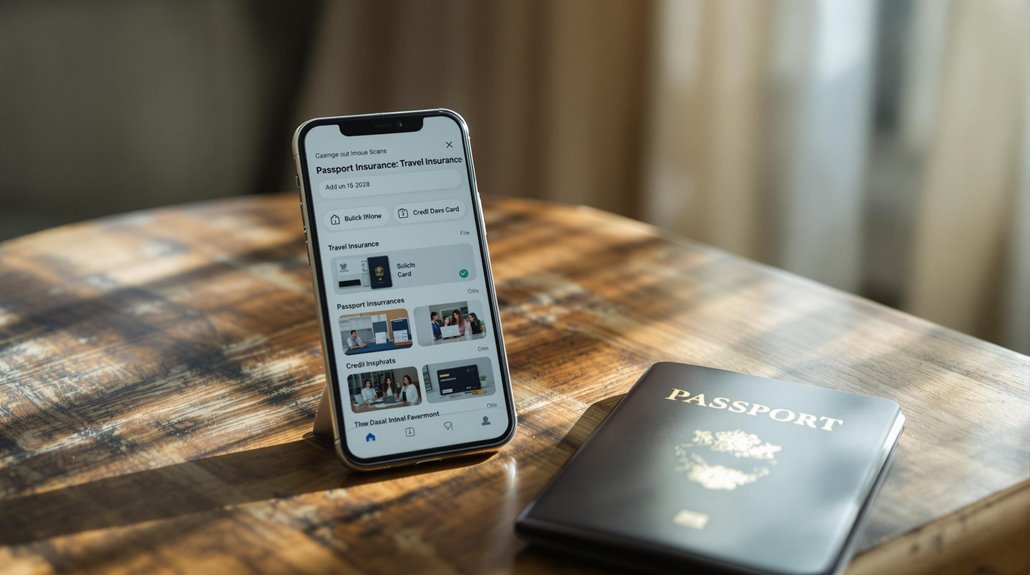
Since losing your passport abroad ranks somewhere between getting food poisoning and accidentally joining a cult, keeping digital copies of your important documents is absolutely crucial.
Before you jet off, snap clear photos or scan all your essential documents, from your passport to your vaccination records. Having copies readily available expedites replacements if your documents are lost or stolen. Taking photos of your insurance policy details provides extra protection for your belongings while traveling.
- Store copies in multiple secure locations – encrypt them on cloud platforms like Dropbox, email them to trusted contacts, and keep them on an encrypted USB drive.
- Create a dedicated folder system so you're not frantically scrolling through photos of your cat when you need your visa copy.
- Convert everything to PDFs for easy sharing with officials or consulates.
- Don't forget to include your travel insurance, hotel bookings, and credit cards (with sensitive numbers partially blocked).
Invest in Anti-Theft Travel Gear
Thieves are getting craftier by the day, but modern anti-theft travel gear is keeping pace with their tricks.
You'll discover bags equipped with slash-resistant materials like eXomesh and Dyneema that'll make would-be cutpurses think twice. Plus, those sneaky RFID skimmers won't stand a chance against specially lined compartments that protect your cards and passport.
Look for bags with lockable zippers and hidden pockets – they're like your own personal Fort Knox for the road. Internal organization needs can vary greatly among travelers, so test different bag styles before committing.
Want extra peace of mind? Grab a backpack with cut-resistant straps and anchor systems that let you secure your bag to chairs or tables while you're sipping that café au lait.
The best part? Many of these security-savvy options now come in stylish, eco-friendly designs that don't scream "tourist."
Split Up Your Cash and Cards
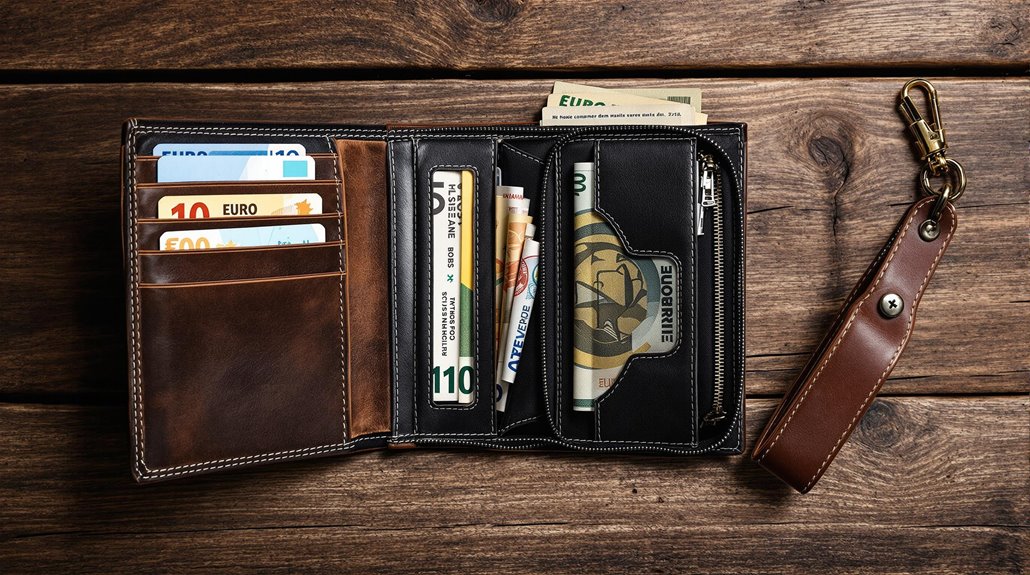
When it comes to protecting your travel funds, putting all your financial eggs in one basket is like wearing a "rob me" sign around your neck.
Instead, embrace the art of strategic fund distribution with a 60/40 cash-to-card ratio, keeping your valuables scattered like a financial treasure hunt.
Smart travelers scatter their money like breadcrumbs, mixing cash and cards to stay one step ahead of misfortune.
- Maintain about 70% of your spending power on prepaid cards for major expenses, while keeping just 30% in cash for those coin-operated moments and street vendor haggling.
- Divide your stash between luggage, hotel safes, and that secret compartment in your travel jacket.
- Pack 2-3 different prepaid cards instead of relying on a single plastic lifeline. Consider utilizing Mastercard Prepaid Services for enhanced security and worldwide acceptance.
- Create a "shadow fund" of $200-$500 tucked away separately from your daily spending money – think of it as your financial safety net.
Taking advantage of unconventional methods like local discount cards and tourist passes can help minimize the amount of cash you need to carry around.
Master the Art of Hotel Room Security
Your hotel room may feel like a cozy sanctuary after a long day of exploring, but treating it like Fort Knox can save you from turning your vacation into a crime scene documentary.
Before settling in, channel your inner detective – check under beds, peek in closets, and scope out bathrooms for unwanted "guests." Request rooms between floors two and four for optimal security during your stay.
Don't just toss your valuables on the nightstand. Stash cash, passports, and electronics in the room's safe (pro tip: place your shoes next to it so you won't forget to empty it later).
For extra-precious items, the front desk's vault is your friend. If you're hitting the beach or pool, pack a portable safe like SafeGo.
And while it's tempting to showcase that view, keep those curtains drawn – especially if you're on the ground floor where windows are easily accessible.
Stay Alert in Tourist Hotspots
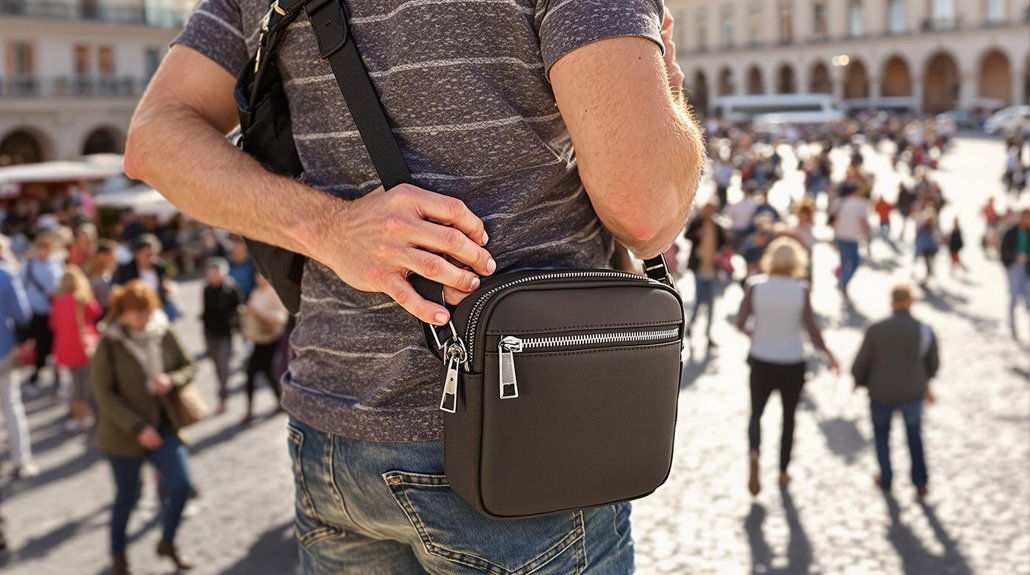
Tourist hotspots might as well have flashing neon signs saying "Easy Pickings!" to opportunistic thieves.
Don't let their sneaky tactics catch you off guard while you're busy snapping that perfect selfie or gawking at famous landmarks.
Calculate your daily budget limit carefully to avoid carrying excess cash while exploring tourist areas.
Here's how to outsmart the pickpockets and scammers:
- Keep your valuables close – use cross-body bags, zippered pockets, and anti-theft wallets instead of that tempting backpack.
- Skip the public Wi-Fi and charging stations – they're like candy for digital thieves.
- Stick to well-lit, crowded areas but stay aware – crowds can be both your shield and your enemy.
- Trust your gut about "helpful" strangers – legitimate tour guides won't randomly approach you.
Remember: You're not being paranoid; you're being street-smart.
Those fancy gadgets and designer bags might look great on Instagram, but they're also sending "rob me" signals to watchful thieves.
Consider getting travel insurance coverage to protect against theft and loss while exploring foreign destinations.
Secure Your Electronics With Tracking Apps
Modern thieves don't just snatch bags anymore – they're after your digital life too. That's why you'll want to arm yourself with tracking apps that turn your devices into digital fortresses.
Apps like StaySafe and Track My Trip act as your personal security guards, sending your GPS coordinates to emergency contacts if you miss a check-in. Some tracking apps like Safety Map Worldwide even notify you when entering potentially dangerous areas.
For your luggage, Logistimatics' 4G trackers keep tabs on your bags even when they're out of sight.
And don't forget to encrypt your devices – it's like giving your data a superhero cape!
Pair these digital defenses with practical measures: slap on privacy screens to dodge nosy neighbors, keep your software updated (those pesky hackers are always evolving), and use the hotel safe like it's your personal Fort Knox.
Pack Smart With Secret Compartments
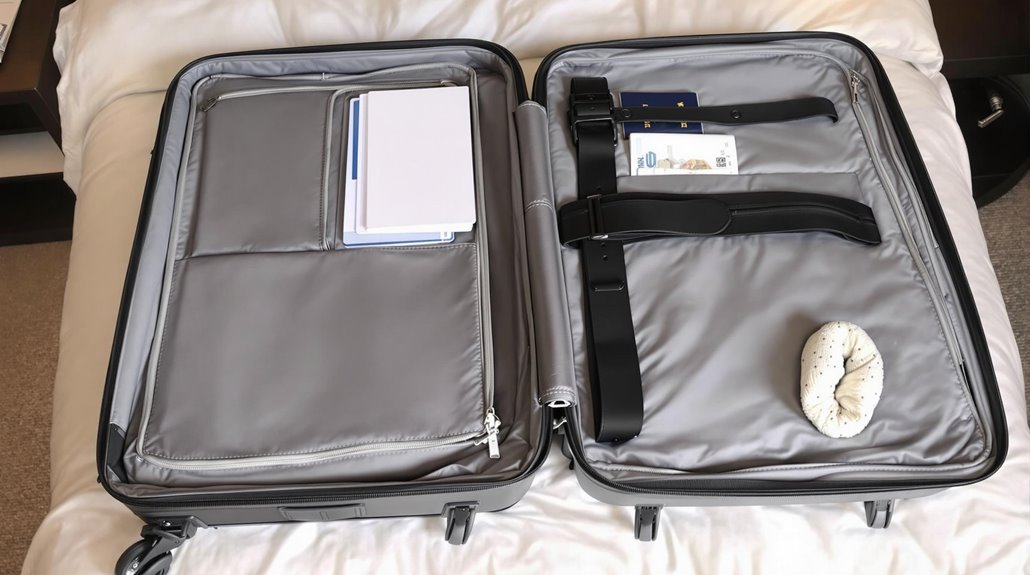
While pickpockets have mastered their traditional tricks, savvy travelers are fighting back with a new generation of secret-compartment luggage.
Today's bags aren't just about hidden pockets – they're sophisticated systems designed to keep your valuables under wraps while maintaining quick access when you need it.
- Look for bags with RFID-blocking compartments, like the Ridge Commuter's back panel pocket, to protect your credit cards and passport from digital thieves.
- Choose expandable options like the Knack Convertible Duffel that cleverly disguise valuables pockets behind trolley sleeves.
- Don't underestimate shoulder strap storage – it's perfect for stashing metro cards or emergency cash.
- Consider slash-resistant bags like Pacsafe Go that integrate steel mesh into the fabric, making it nearly impossible for thieves to cut their way to your goods.
The WANDRD PRVKE offers dual access points to your main compartment through both a roll-top and back zipper, ensuring you can quickly retrieve items without exposing all your belongings in crowded places.
Practice ATM and Credit Card Safety
Savvy international travelers know that ATMs and credit cards can be both a blessing and a curse abroad. While they're convenient, they can also make you a target if you're not careful.
You'll want to stick to bank-operated ATMs in well-lit areas, preferably inside hotels or near information kiosks where there's plenty of foot traffic. Make sure to always cover the keypad when entering your PIN.
Before you insert your card, channel your inner detective – inspect that ATM like you're looking for criminal evidence. Check for loose parts, hidden cameras, or anything suspicious.
And please, don't be that person counting cash at the machine like you've just won the lottery. Grab your money, stash it away quickly, and save the counting for later.
Remember to notify your bank of travel plans and keep a backup card hidden separately from your main stash.
Register Your Trip With Your Embassy
A smart traveler's best friend isn't their money belt or hidden passport pouch – it's their embassy registration. Through STEP (Smart Traveler Enrollment Program), you'll get a direct line to your embassy when things go sideways abroad. It's free, takes just minutes, and could be a lifesaver during emergencies. U.S. citizens and nationals can easily register their travel details for added protection.
Here's what you'll get when you register at step.state.gov:
- Real-time safety alerts about natural disasters or political unrest
- Emergency communication if your family needs to reach you
- Priority access to evacuation plans during major crises
- Post-emergency support if you lose your passport or need help
Don't forget to update your itinerary if plans change, and keep your contact info current.
Think of STEP as your personal diplomatic insurance policy – it's better to have it and not need it than vice versa.
Secure Your Luggage During Transit
Traveling with your belongings shouldn't feel like playing luggage roulette at 30,000 feet.
Take control of your bag's destiny by investing in TSA-approved locks and anti-theft tags that'll make your suitcase stand out from the sea of black rollers on the carousel.
When booking connections, check if your airlines have codeshare or interline agreements – these nifty partnerships mean your bags can transfer smoothly without you breaking a sweat at customs. Major carriers with efficient international connections typically ensure automatic baggage transfers without rechecking requirements.
Don't put all your eggs (or socks) in one basket, either. Spread your valuables across different bags, and always keep essentials in your carry-on.
For extra peace of mind, stash your passport and emergency cash in hotel room safes, and use sturdy padlocks when sharing hostel spaces.
Your future self will thank you for being travel-savvy.
Create a Daily Security Routine
Your daily security routine abroad should be as natural as brushing your teeth – but with less toothpaste and more street smarts.
Think of it as your personal safety dance that'll keep your valuables secure while you're living your best travel life.
- Start each morning by double-checking your room's safe, ensuring your backup cash is still in its secret hideaway, and rotating your valuable storage spots – because predictability is a thief's best friend.
- Before heading out, secure your anti-theft bags and RFID-blocking wallet while doing the "pat-down dance" – phone, passport, cash check!
- Throughout the day, maintain the buddy system with your belongings – no unattended drinks or bags playing solo. Consider using a burner phone specifically purchased for travel to protect your personal data.
- End each night by updating passwords, backing up photos, and scheduling tomorrow's check-in with folks back home.
Know Local Emergency Contact Numbers
While your daily security routine keeps your belongings safe, having the right emergency numbers at your fingertips can save you from sticky situations abroad.
Trust me, you don't want to be frantically googling "police number in Paris" while chasing down a pickpocket with your passport!
Before departure, jot down local emergency numbers – they're not always 911 like back home. Europe uses 112, while other countries have unique digits for police, fire, and medical services.
Keeping a written backup list stored somewhere separate from your phone ensures you can still access these crucial numbers even if your device is lost or stolen.
Smart travelers also program their nearest U.S. Embassy's contact info into their phones (labeled something obvious like "U.S. Embassy Tokyo" – because who needs mystery during an emergency?).
Take it a step further by enrolling in STEP for real-time safety updates and crisis support. Your future panicked self will thank you!
The Last Word
You're now armed with enough security tips to make Fort Knox jealous! While you can't wrap yourself in bubble wrap or hire a personal army of bodyguards, these simple precautions will help keep your belongings safer than a penguin in Antarctica. So go ahead – explore those exotic destinations, try those strange foods, and make unforgettable memories, knowing you've outsmarted potential pickpockets and travel troubles!

